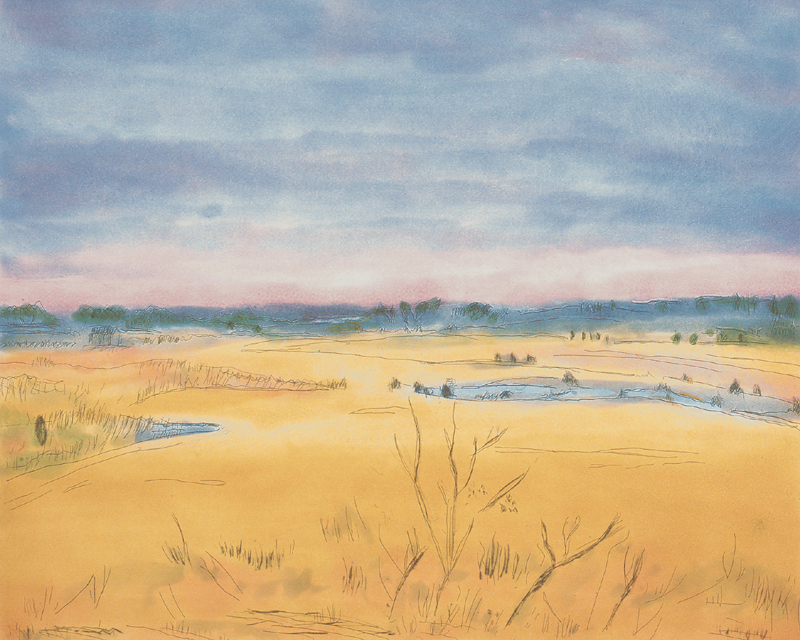Jane Freilicher
When I start painting, it's with this rush of feeling—an emotional reaction to something I find beautiful in the subject, which provides the energy, the impetus to paint. Then, as the process of painting evolves, other things enter into it—a discovery of what it is I think I'm seeing.
Born in New York in 1924, Jane Freilicher (neé Niederhoffer) was the daughter of a linguist father and musician mother. In a conversation with art critic Eleanor Munro, Freilicher recalled being artistic at a young age: “I might do something in art, not for fame or achievement, but out of a romantic inclination to beautiful things. A freefloating feeling that something was creative in me.” After graduating high school at the age of 17, she eloped with a jazz pianist named Jack Freilicher in 1941. The marriage was annulled five years later. Freilicher earned a bachelor’s degree in art from Brooklyn College in 1947 and earned a master’s degree from Columbia University’s Teachers College in 1948.
In the late ‘40s, Freilicher began to study with Hans Hoffmann after being recommended by Nell Blaine, a friend and contemporary. During this time Freilicher began to create abstract expressionist paintings, but shifted away from that style to figuration. ”It was not a matter of choice,” she said in a New York Times interview. ”But I couldn’t find a kernel in that kind of painting to split open. I have to struggle, to make something coherent, so the work engages me and leads me into some kind of excitement — will I win over this obstacle? I felt I couldn’t find a struggle within Abstract Expressionism.” Freilicher painted landscapes and still lifes, engaging in subjects of quiet countrysides and fresh flowers arranged in vases. Occasionally criticized as ”a domestic painter,” Freilicher was, for many years, ”hard to sell,” as she has said herself. ”I have always gone my own way,” she said in an interview. ”In a way it’s been a kind of relief. Balthus once said of himself, ‘I am a painter about whom nothing is known.’ Of course, that’s not really true of him. But it is true of me.”
In the ‘50s, Freilicher became involved with the New York School, the informal group of writers and artists who hung out in a loft on East 8th Street. Nicknamed ‘painter among poets’, she also served as a muse to the group, inspiring poetry by Frank O’Hara, Kenneth Koch and John Ashbery. Freilicher and Ashbery shared a long friendship that began when the poet came to stay in Koch’s apartment below Freilicher’s; she provided the key to let him in. “One doesn’t stay friends with somebody for forty years unless they have a lot of nice qualities, such as brilliance. Jane Freilicher, famous for her light-swept, vaporous paintings, is also the wittiest person I’ve ever known, but her wit is the casual, throwaway kind. It’s a privilege to be able to ‘tickle the conversational ivories’ with her.” For Kenneth Koch, her sensibility was “a crucial part of the New York School’s influence.”
In 1957, Freilicher married painter Joseph Hazan and later, gave birth to a daughter, Elizabeth, who also became a painter. Freilicher showed at the Tibor de Nagy Gallery, Benson Gallery, Fischbach Gallery, and John Bernard Meyers Gallery in New York. In 2005, she won the Gold Medal for Painting from the American Academy of Arts and Letters. Her other honors include the National Academy of Design Saltus Gold Medal and the Academy of the Arts Lifetime Achievement Award from the Guild Hall Museum. Her work is widely collected and is represented in major museum collections throughout the United States, including the Whitney Museum of American Art, the Metropolitan Museum of Art, and the Museum of Modern Art. Freilicher’s papers with poetry and photographs of her relationships with the New York School writers and artists are kept by the Houghton Library of Harvard University. Freilicher lived and worked in Manhattan and in Water Mill, Long Island until her death in 2014 at the age of 90. The Estate of Jane Freilicher is represented by Paul Kasmin Gallery and advised by Eric Brown in New York.
-Carleigh Koger
